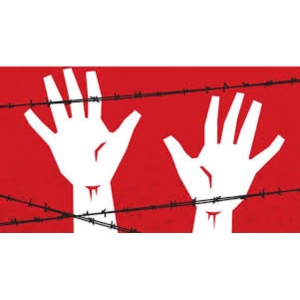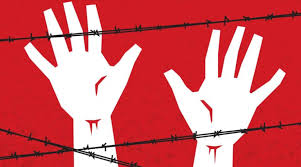
.jpg) Aakash
Aakash

Historically, forcible arrests without charges have been a tactic employed by governments globally to maintain authoritative control. While they are often justified under the pretence of maintaining law and order, these arrests frequently serve as instruments of political repression, targeting dissent and curbing opposition, as evidenced by the lack of charges and the arrested persons languishing in jails without trials for months and years. They have been contentious due to their human rights and political freedom implications.
All regimes that have relied heavily on forcible arrests to consolidate power and silence critics have turned out to be authoritarian. In the Soviet Union, Joseph Stalin's Great Purge of the 1930s saw millions of people arrested and executed or sent to labour camps. These arrests were a tool to eliminate perceived enemies and instil a climate of fear, ensuring compliance and quashing potential rebellion. Similar patterns were evident in Nazi Germany, where the Gestapo arrested and detained individuals without trial, targeting Jews, political dissidents, and other marginalised groups. These forcible arrests were instrumental in enforcing the regime's totalitarian control and genocidal policies.
Forcible arrests without charges continue to be a critical tool for authoritarian governments in modern times, too. In China, the government has used forcible arrests to suppress the Uyghur population in Xinjiang. Reports indicate that over a million Uyghurs have been detained in what the government calls "re-education camps." These arrests, often without legal basis, are part of a broader campaign of cultural assimilation and political indoctrination, drawing widespread international condemnation for human rights abuses.
In Russia, the government has also utilised forcible arrests to stifle opposition. High-profile cases include the arrest of Alexei Navalny, a prominent critic of President Vladimir Putin. Navalny's detention in 2021 sparked an international outcry and widespread protests within Russia. He later died in prison, having suffered maltreatment. The Russian government frequently employs these tactics against protesters, journalists, and activists, aiming to dismantle organised dissent and maintain strict control over the political narrative.
Similarly, in Turkey, President Recep Tayyip ErdoÄŸan's government has carried out mass arrests following the failed coup attempt in 2016. Thousands of military personnel, academics, journalists, and civil servants were detained in the aftermath, accused of having connections to the Gülen movement, which the government blamed for the coup. These arrests have been criticised as a means to eliminate political rivals and suppress free speech, further entrenching ErdoÄŸan's authoritarian rule.
Even in democracies, forcible arrests can be a method to address civil unrest, though their use often sparks significant debate and controversy. In the United States, the Black Lives Matter protests following the death of George Floyd in 2020 saw numerous instances of forcible arrests by law enforcement. Critics argue that the heavy-handed approach, including the use of riot control tactics and mass detentions, exacerbates tensions and undermines trust in the police. Proponents, however, contend that such measures are necessary to maintain order and prevent violence during large-scale demonstrations.
In India, the use of forcible arrests has been very prominent in recent years, especially after the NDA came into power. We have a recent example of Kashmir, where the government detained political leaders, activists, and civilians under the Public Safety Act, mostly without formal charges. In addition, the UAPA and PMLA are used blatantly to subjugate outcries and dissent. Authorities' use of preventive detention laws to keep individuals without trial for extended periods has led to an enormous number of prisoners who are languishing in jails.
Journalists and media that refuse to buckle under the regime's knuckles are often victims of the abuse of such laws. The number of journalists charged under draconian laws indicates India's perilous state of free speech. From 2010 to now, 16 journalists have been charged under the UAPA. Such draconian laws are often invoked to criminalise the legitimate work of journalists, tagging them as terrorists. While such action prevents the regime's illegitimate actions from being brought to light, it also creates a chilling effect that seeks to deter others from dissenting.
Previous versions of the UAPA allowed only groups to be designated as terrorists. In July 2019, the UAPA was amended, allowing the government to designate an individual as a terrorist without trial. Its punishing process is designed to make jail the rule and bail the exception. Cases under the UAPA have continued literally for decades. In more than 97 per cent of the cases, persons are acquitted after the prosecution fails to prove their guilt, as the arrests are made without evidence. In many cases, the trials do not even begin until after several years of the arrest. Under UAPA, a person can be arrested without any evidence, which is against democracy.
Prabir Purkayastha, an engineer in the power, telecom, and software sectors, a founding member of the Delhi Science Forum and the founder and editor-in-chief of NewsClick, was arrested in October last year under the UAPA without formal charges. He was sent to remand without him or his lawyer being provided any grounds for arrest. The FIR against Purkayastha and the head of NewsClick's human resources department, Amit Chakravarty, cites Sections 13 (unlawful activities), 16 (terrorist act), 17 (raising funds for terrorist acts), 18 (conspiracy) and 22 (C) (offences by companies, trusts) in the UAPA, along with IPC sections 153A (promoting enmity between different group) and 120B (criminal conspiracy). Section 153A against the media is another favourite of law enforcement agencies and has been used against several journalists, including Neha Dixit and Paranjoy Guha Thakurta.
Though the state argued that Prabir should not be released on a technicality, the Court was adamant that every accused "has a fundamental and a statutory right to be informed about the grounds of arrest in writing and a copy of such written grounds of arrest have to be furnished to the arrested person as a matter of course and without exception at the earliest." It is noteworthy that Prabir got out relatively faster. Others still continue to be imprisoned.
Data shows a 23 per cent incline in UAPA cases in 2022 compared to previous years, while PMLA cases grew by 450 per cent in the first three years of the current government's second term compared to the same period in its first term.
Along with the UAPA, the Public Safety Act, the Chhattisgarh Jan Suraksha Adhiniyam, the National Security Act, and provisions like sedition in the Indian Penal Code have also been deployed indiscriminatingly to charge journalists, human rights activists, lawyers, students, workers, tribals and minorities. The most crucial problem in these cases is the loss of liberty. They are deprived of their freedom even though they haven't been convicted of a crime. Along with that comes social stigma and loss of opportunities.